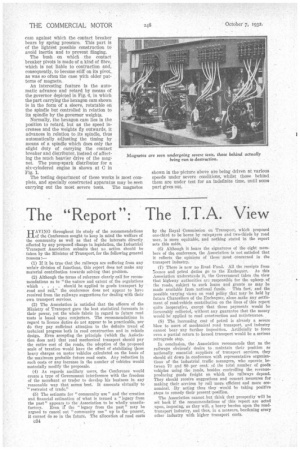The "Report" The LTA. View
Page 84

If you've noticed an error in this article please click here to report it so we can fix it.
ILTAVING throughout its study of the recommendations 11of the Conference sought to keep in mind the welfare of the community as well as that of the interests directly affected by any proposed change in legislation, the Industrial Transport Association submits that no action should be taken by the Minister of Transport, for the following general reasons :— (1) If it be true -that the railways are suffering from any unfair division of functions, this report does not make any material contribution towards solving that problem.
(2) Although the terms of reference clearly call for recommendations as to "the nature and extent of the regulations which . . . . should be applied to goods transport by road and rail," the conference does not appear to have received from the railways suggestions for dealing with their own transport services.
(3) The Association is satisfied that the officers of the Ministry of Transport gave the best statistical forecasts in their power, yet the whole fabric in regard to future road Costs is based upoa conjecture. The recommendations in regard to licence duties do not appear to be practicable nor do they pay sufficient attention to the definite trend of technical progress both in road construction and in vehicle &sign. Even accepting the principle (which the Askiociation does not) that road mechanical transport should pay the entire cost of the roads, the adoption of the proposed scale of taxation Would have the effect of stabilizing those heavy charges on motor vehicles calculated on the basis of the maximum probable future road costs. Any reduction in such costs or any increase in the number of vehicles would materially modify the proposals.
(4) As regards ancillary users, the Conference would create a type of Government interference with the freedom of the merchant or trader to develop his business in any reasonable way that seems best. It amounts virtually to '" restraint of trade."
(5) The estimate for "community use" and the creation and financial estimation of what is termed a "legacy from the past" appears to the Association to be wholly unsatis
factory. Even if the "legacy from the past" may be argued to cancel out "community use" up to the present, it cannot do so in the future. The allocation of road costs c34 by the Royal Commission on Transport, which proposed one-third to be borne by ratepayers and two-thirds by road user, is more equitable, and nothing stated in the report sets this aside.
(3) Although it bears the signatures of the eight members of the, conference, the Association is not satisfied that it reflects the opinions of those most concerned in tho transport industry.
(7) There is now no Road Fund. All the receipts from ricence and petrol duties go to the Exchequer. As this Association understands it, the Government takes the view that highway authorities aro responsible for the upkeep of the roads, subject to such loans and grants as may be made available from national funds. This fact, and the possible varying views on road policy that may be held by future Chancellors of the Exchequer, alone make any settlement of road-vehicle contribution on the lines of this report quite inoperative, except that those payments would be inexorably collected, without any guarantee that the money would be' applied to road construction and maintenance.
(8) The increasing cost of petrol is already a severe blow to users of mechanical road transport, and industry cannot bear any further imposition. Artificially to force even a partial return to horsed transport would be a serious retrograde step.
In conclusion, the Association recommends that as the railways obviously desire to maintain their position as nationally essential suppliers of transport services, they should sit down in conference with representative organizations of the industrial traffic managers, who operate between 70 and SO per cent. of the total number of goods vehicles using the roads, besides controlling the revenueproducing goods freight on which the railways depend. They should receive suggestions and concert measures for making their services by rail more efficient and more economical. By acting thus they would be taking positive steps to remedy their present position.
The Association cannot but think that prosperity will be set back if the recommendations of this report are acted upon, imposing, as they will, a heavy burden upon the roadtransport industry, and thus, in a measure, burdening every other industry with higher transport costs.




































































































































































